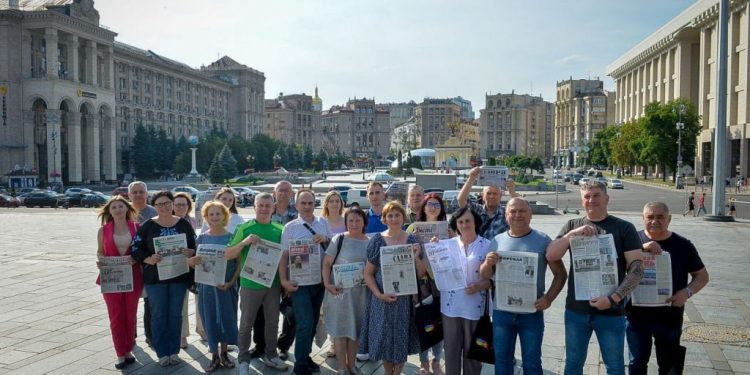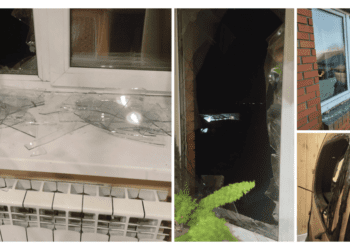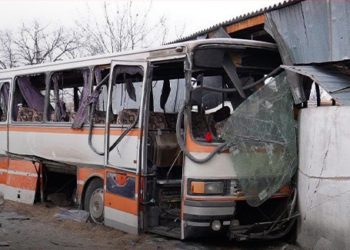The project titled Strengthening Media In Recently De-Occupied Territories is aimed at strengthening the capacity of local media in the reintegration of liberated territories, debunking fakes and propaganda, and overcoming the harmful effects of occupation and war for the consciousness of residents of the front-line regions. Thanks to the support, journalists will be able to increase the amount of content for local media to meet citizens’ needs for verified objective information and ultimately – to deepen cooperation between local media and representatives of civil society for positive changes in communities.
The project is implemented by the National Union of Journalists of Ukraine (NUJU) as part of the USAID project Democratic Governance in Eastern Ukraine. Newsrooms and journalists from the Kharkiv, Donetsk, Luhansk, Zaporizhzhia, Kherson, and Kyiv Regions will be participants in the project.
At the start, the team will conduct a survey of the information needs of residents of the de-occupied and front-line territories. Taking into account these needs, journalists will plan the topics of future materials.
“The shortage of true information is most acutely felt in the front-line zone, where in some places there is neither the Internet nor a television signal. And then the local newspaper becomes the only source of reliable information for a person,” says the President of the NUJU, Sergiy Tomilenko. “Therefore, for us, supporting local media from the front-line and de-occupied territories is a priority. After all, such media not only provide verified information about local events but also provide public control over the reconstruction process.”
The participants of the project will be 20 newsrooms and 50 local journalists, bloggers, and civil activists, who will be selected on a competitive basis according to objective and transparent criteria. The organizers will announce the start of the competitive selection and its criteria on the official website and social networks.
The project team will work in three main directions. The first is Informational De-Occupation, where cooperation will be established between journalists, public organizations, and local self-government bodies in order to get rid of the consequences of russian influence. The second direction, Stabilization and Restoration of Local Mass Media, involves a mentoring program and the development of plans for exiting the crisis of the participating newsrooms. Within the framework of the third direction, Improving Journalistic Skills in De-Occupied Territories and Strengthening Motivation of Communities to Change, participants, together with mentors, will work on increasing the motivation of community residents to promote reforms.
“Local media will be able to improve the level of materials, master new digital tools, and diversify sources of income that will help them become economically stronger. In addition, we will launch a series of trainings on conflict-sensitive journalism, as well as teach civil activists and bloggers from the de-occupied territories to create content for the media, influence and achieve change,” says the project manager/First Secretary of the NUJU, Lina Kushch.
Representatives of the local media say that they are working under conditions of lack of personnel and other resources. The project will be useful for such newsrooms because it is designed to help make publications modern and relevant.
“In conditions when the front is 30 kilometers away from us, it is very difficult to work. There is not enough professional staff because many journalists were forced to leave, close, or relocate their publications. But there are still residents in the community who want to read the local press. We have a lot to write about, there are a lot of topics, and in order to process all requests from people to write materials, we even began to involve students. Therefore, training in such a project will definitely be useful for our new authors,” says Tetiana Velyka, the editor-in-chief of the Holos Huliaipillia newspaper (Zaporizhzhia Region).
The implementation of the project became possible thanks to the sincere support of the American people provided through USAID. The NUJU implements the project Strengthening Media In Recently De-Occupied Territories with the support of the USAID project titled Democratic Governance in Eastern Ukraine.
Reference information:
About NUJU
The National Union of Journalists of Ukraine is the largest journalistic organization in Ukraine, which unites 18,000 members and has regional organizations in each region. Since the beginning of the full-scale war, the NUJU has directed its activities to help Ukrainian journalists and media, including through the created Network of Journalists’ Solidarity Centers. For two years, more than 4,500 media workers and more than 200 newsrooms have benefited from various types of help and services from the Union. With the support of the organization, during the war, 31 local newspapers resumed publication in the de-occupied and front-line territories.

 THE NATIONAL UNION OF
JOURNALISTS OF UKRAINE
THE NATIONAL UNION OF
JOURNALISTS OF UKRAINE
















Discussion about this post